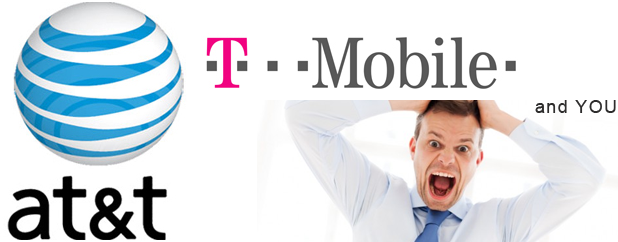15 Dec Too Big to Fail…Not Quite – AT&T, T-Mobile And You

The carriers are at it again, this time doing what they think is best to protect their discounted equipment they offer customers. What they don’t understand, or are ignoring, is the fact that this will be retroactive; let me explain.
When you purchase a phone from one of the major carriers like AT&T or T-Mobile you sign into a contract that states, in laymen terms, the phone you just paid for is not yours. You paid your carrier $199 for the phone you want, but it’s still theirs until you honor your end of the agreement and pay them for 2 years of service. Anyone with access to a calculator can figure out that the total cost of that “discounted” device isn’t so discounted.
There’s more. The carriers are now blocking access to their network. You read that right. They are blocking cellular devices from using their network. This sounds pretty illogical seeing as though the goal of these carriers is to cram as many possible subscribers onto their network as possible – but not if you are trying to use a phone that was purchased at a discount and the contractual obligations of that device were not followed through with.
Let’s dig deeper into this with some examples of how a device could be blocked. If you are a customer that purchased your device with a subsidy and decide you are happy with your monthly service and decline to pay, the IMEI of that device will be blocked on your current network by the carrier. If a Craigslist seller goes into AT&T and opens 2 lines in order to purchase the devices at a discount to resell them and does not fulfill the contractual obligations the network requires, the IMEI’s are blocked and – in this particular example – the Craigslist seller is not the victim, his customer is. Unbeknownst to him, when he purchases the device from the Craigslist seller and attempts to activate on the AT&T Network, the customer service rep will actually inform the user that the device was “stolen” – instead of explaining to them that the account the device is registered to is past due or in collections. Aggravated and discouraged, this user will likely simply attempt to resell the device on eBay or Craigslist to try to recover some of the loss – without disclosing his newly acquired information about the device – another victim becomes involved. The process is repeated until the end user gives up, chalks it up as a loss and seeks a new device that is not restricted – or he uses that same device on a different carrier. Wait, a different carrier? Yes, the device can be unlocked and used on another network (or resold overseas, but I’ll cover that later) perfectly without interruption.
Why would a carrier force a potential customer to use the device on another network or in another country? I asked myself the same question and to this day do not have an answer. They are attempting to discourage the reselling of their discounted devices – that’s evident. But it’s not working. Every “stolen” AT&T and T-Mobile device available will be exported to another country. While they work hard to deter fraud and reselling, it actually has the reverse effect due to the expanding market of unlocked phones in other countries. They have likely invested millions to develop this program to restrict IMEI’s when all they had to do was hire better educated staff and have tougher restrictions in stores and online.
Just recently AT&T has started to restrict IMEI’s of devices on their network, however, T-Mobile has been doing this for the past 8 months or more. T-Mobile reported earnings down about 6% last quarter, while profit is down 15%. Is this a direct relation to this master plan they had – it’s likely, but the true test will be in January when they report Q4 2012 earnings.
MVNO’s aren’t even safe. Carriers are hurting the MVNO’s that they have agreements with (not just by offering competitive pre-paid plans themselves) but if the phone is reported “stolen” on a T-Mobile network, it won’t work on a T-Mobile MNVO either (e.g. Simple, NET10, Spot, Solavie and more). So these MVNO’s that try so hard to gain market share are going to suffer because their parent (carrier) wants to crack down on their discounted devices being resold for profit.
Carriers generally know what they are doing, but they did not forecast this plan very well. This will end up being detrimental to the carriers that take part in this act. It will push customers to other carriers without these restrictions, it will increase the sales of OEM/Unlocked devices in the US and increase the exports of all carrier branded devices from the US.
For the carriers, restricting access to your network is not the correct avenue. It’s also not my job to explain to what the correct avenue is and it would in fact be foolish to do so. You, the carriers, are a big enough thorn in my company’s side already. You block IMEIs of these “stolen” devices; you discount devices so much that people confuse the subsidized price as the actual cost of the device; and you restrict the sale of devices at the full retail price to other customers in order to lock someone else into a contract. Do the manufactures know you are doing this – employing a sales team that all but prohibits customers from coming into your store and paying full price for the device they want? RIMM’s legal team would have had a field day with AT&T had they been made aware of this before it was too late; and yes it is too late for RIMM.
While I won’t tell you how to fix the above issue here are some helpful tips to help you control your customer base, increase loyalty, decrease losses on discounted devices and not be generally hated by a large portion of your customers:
- Sell your hardware full price, don’t offer the discounts. Discount the service instead.
- Write off the losses to Marketing. Your devices have your logo and shitty software all over them already.
- Treat customers with respect. You have loyal customers that never receive any discounts or incentives. It’s always a push to increase your subscriber base – but first you need to make the current subscriber base happy. Lower their plans cost if they are with you for 1-2 years. That’s a long time in this day and age. People spend 2 hours porting their number just to save $5 a month.
To conclude this rant, I’d like to thank you for your time in reading. Hopefully you were able to gain some insight from these details. To be safe, purchase a device directly from the carrier or a trusted company that will honor a return in the unlikely chance of a restricted IMEI.
